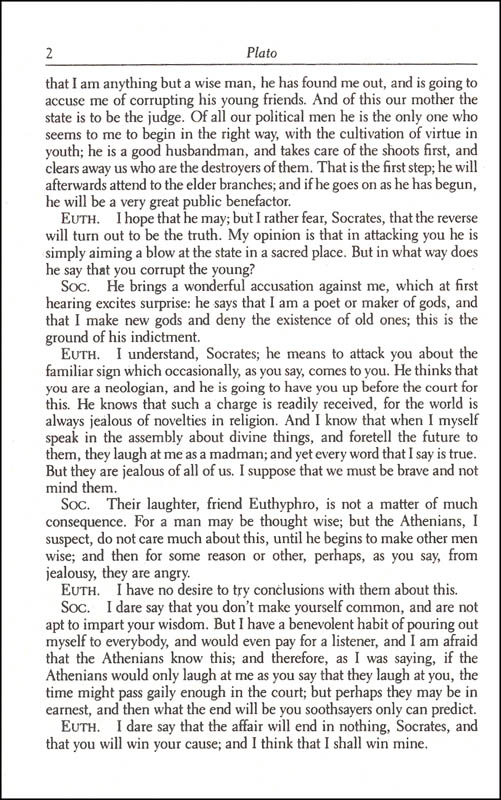

The fourth and final dialogue, "Phaedo," is the longest of the four, and is the only one in which Socrates is not physically present. Socrates gratefully and gently refuses, explaining that his sense of loyalty to the state and its judgment, which he believes to be inspired by the pure principle of justice, is too strong. It takes place in Socrates' prison cell, where he is visited by a wealthy friend and ally, Crito, who urges him to take advantage of the offers of support from him and other wealthy Athenians, and escape. The third dialogue, "Crito," is the briefest of the four in this collection. His efforts are in vain, however: the narrative describes how Socrates is found guilty of the charges against him and is sentenced to death, a consequence that Socrates accepts with humor and realism. He also engages Meletus, his chief accuser, in debate, attempting to prove to both Meletus and the court that the case against him has no merit. He begins by outlining his life story, describing how he became a philosopher through the influence of the gods, and how he sees himself as being on a quest for wisdom, rather than forcing it on others (which is a component of the crime he's charged with). The second dialogue, "Apology," starts out as a monologue, as Socrates makes his defense to the Athenian court. The two men debate the natures of both piety and justice, their conversation ending when Socrates proves to Euthyphro that his (Euthyphro's) actions are not what he believes them to be, and Euthyphro leaves in confusion. The two men encounter one another outside the Athenian version of the law courts, where Socrates is about to go on trial for corrupting the youth of the city and Euthyphro is about to bring charges of murder against his father. The first dialogue in the collection is given the title "Euthyphro," after the name of the first citizen who engages Socrates in dialogue. Written by Plato, a pupil of Socrates and a noted philosopher in his own right, the four dialogues in this collection take place over a period of time from the beginnings of Socrates' trial in Athens to the day of his execution, and explore themes relating to the nature of existence, the nature of death, and the value of wisdom. This collection of conversations between classical Greek philosopher Socrates and those who question and/or challenge him is one of the earliest, and most significant, works of philosophy in history.


 0 kommentar(er)
0 kommentar(er)
